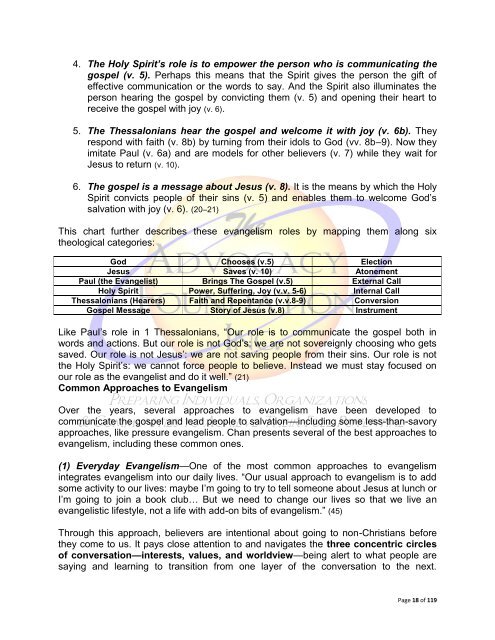International Legal Evangelism: Intelligence, Reconnaissance & Missions
International Legal Evangelism: Intelligence, Reconnaissance & Missions
International Legal Evangelism: Intelligence, Reconnaissance & Missions
You also want an ePaper? Increase the reach of your titles
YUMPU automatically turns print PDFs into web optimized ePapers that Google loves.
4. The Holy Spirit’s role is to empower the person who is communicating the<br />
gospel (v. 5). Perhaps this means that the Spirit gives the person the gift of<br />
effective communication or the words to say. And the Spirit also illuminates the<br />
person hearing the gospel by convicting them (v. 5) and opening their heart to<br />
receive the gospel with joy (v. 6).<br />
5. The Thessalonians hear the gospel and welcome it with joy (v. 6b). They<br />
respond with faith (v. 8b) by turning from their idols to God (vv. 8b–9). Now they<br />
imitate Paul (v. 6a) and are models for other believers (v. 7) while they wait for<br />
Jesus to return (v. 10).<br />
6. The gospel is a message about Jesus (v. 8). It is the means by which the Holy<br />
Spirit convicts people of their sins (v. 5) and enables them to welcome God’s<br />
salvation with joy (v. 6). (20–21)<br />
This chart further describes these evangelism roles by mapping them along six<br />
theological categories:<br />
God Chooses (v.5) Election<br />
Jesus Saves (v. 10) Atonement<br />
Paul (the Evangelist) Brings The Gospel (v.5) External Call<br />
Holy Spirit Power, Suffering, Joy (v.v. 5-6) Internal Call<br />
Thessalonians (Hearers) Faith and Repentance (v.v.8-9) Conversion<br />
Gospel Message Story of Jesus (v.8) Instrument<br />
Like Paul’s role in 1 Thessalonians, “Our role is to communicate the gospel both in<br />
words and actions. But our role is not God’s: we are not sovereignly choosing who gets<br />
saved. Our role is not Jesus’: we are not saving people from their sins. Our role is not<br />
the Holy Spirit’s: we cannot force people to believe. Instead we must stay focused on<br />
our role as the evangelist and do it well.” (21)<br />
Common Approaches to <strong>Evangelism</strong><br />
Over the years, several approaches to evangelism have been developed to<br />
communicate the gospel and lead people to salvation—including some less-than-savory<br />
approaches, like pressure evangelism. Chan presents several of the best approaches to<br />
evangelism, including these common ones.<br />
(1) Everyday <strong>Evangelism</strong>—One of the most common approaches to evangelism<br />
integrates evangelism into our daily lives. “Our usual approach to evangelism is to add<br />
some activity to our lives: maybe I’m going to try to tell someone about Jesus at lunch or<br />
I’m going to join a book club… But we need to change our lives so that we live an<br />
evangelistic lifestyle, not a life with add-on bits of evangelism.” (45)<br />
Through this approach, believers are intentional about going to non-Christians before<br />
they come to us. It pays close attention to and navigates the three concentric circles<br />
of conversation—interests, values, and worldview—being alert to what people are<br />
saying and learning to transition from one layer of the conversation to the next.<br />
Page 18 of 119

















